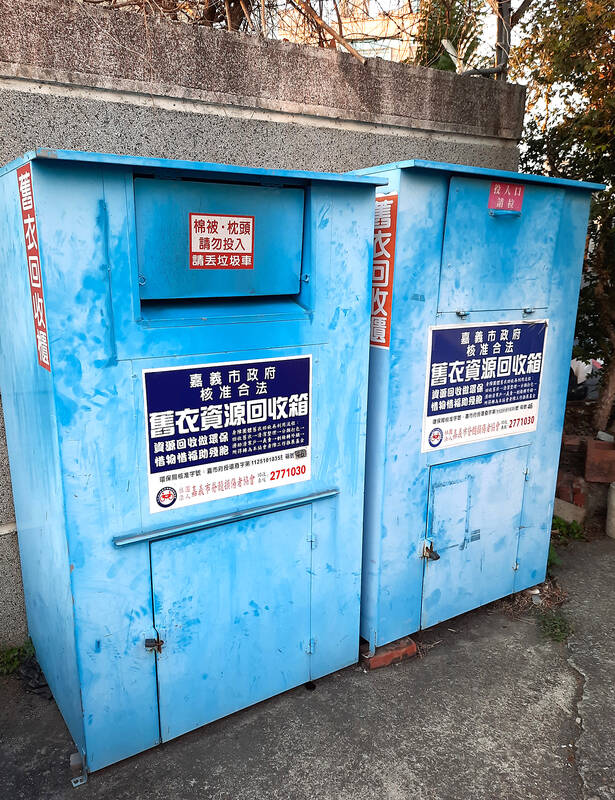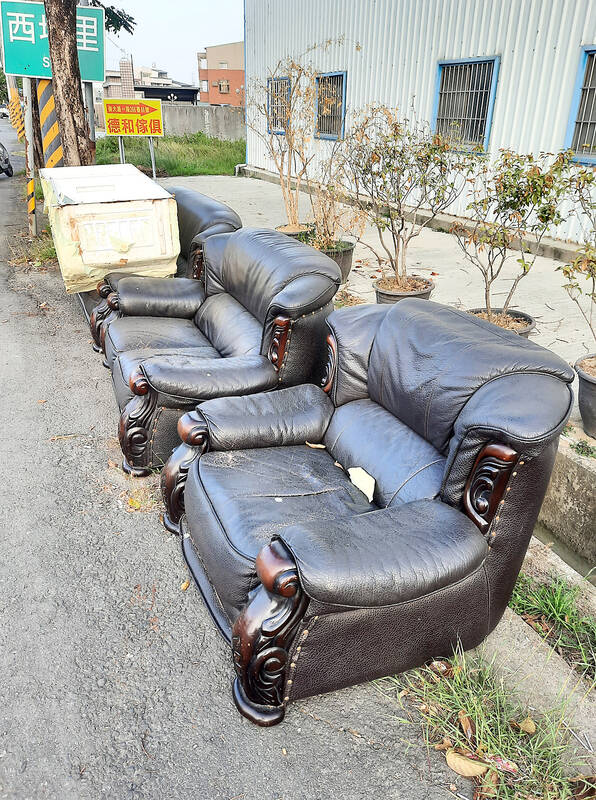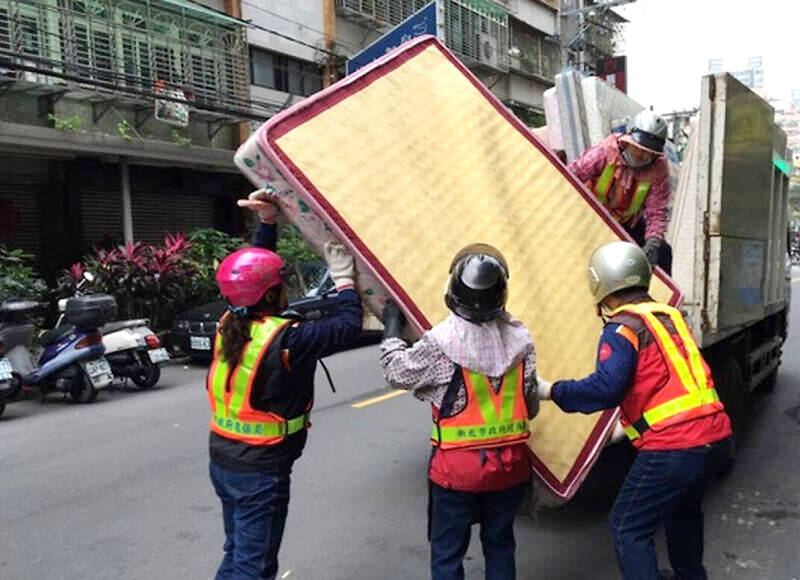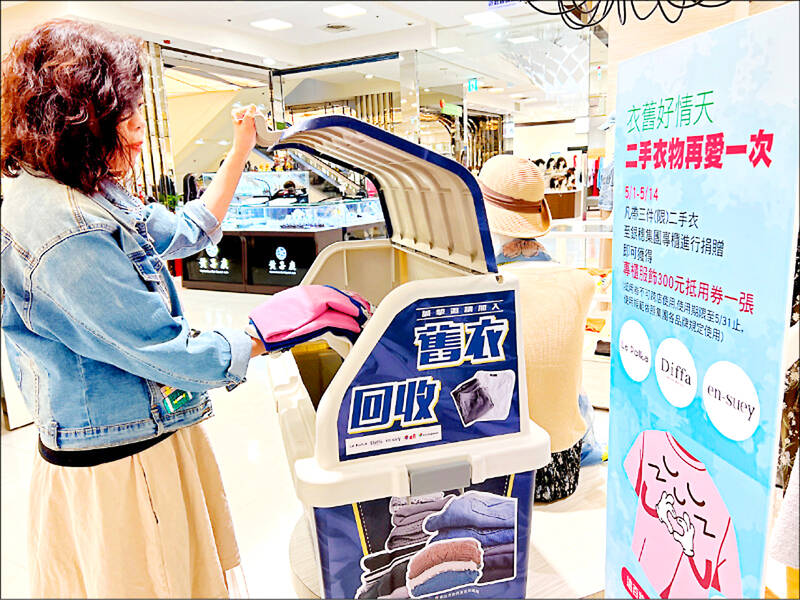The Year of the Dragon is approaching. According to the ancient lunisolar calendar Taiwanese still use to determine festival dates and schedule religious events, Feb. 10 will be the first day of the new year.
As the Year of the Rabbit draws to a close, millions of families are giving their homes a thorough cleaning. Traditionalists believe that wiping down every surface and clearing the dust out of every corner will cast out whatever misfortunes were accumulated during the previous months.
One idiom bandied around in this season can be translated as “clear out the old and replace it with the new” (除舊佈新). Many see it as an injunction to get rid of items they no longer use. As a result, just before the Lunar New Year, waste management systems across the country are deluged with clothes, household appliances and pieces of furniture which are perfectly usable but unwanted.

Photo: Steven Crook
PRESTIGE PURCHASES
Compared to people in Western societies, few Taiwanese are enthusiastic about secondhand goods. For some, it’s a matter of prestige. They worry that, if they’re seen using something that was pre-owned, their acquaintances might assume they don’t earn enough to buy a brand-new equivalent.
There are exceptions, of course. A mother of three surnamed Yang (楊) says she’s long encouraged the janitorial staff in her apartment complex in Kaohsiung’s Nanzi District (楠梓) to set aside anything that she or other residents might want when they’re organizing trash for collection. Over the years, she’s salvaged clothes, crockery, footwear “and lots of books and toys.”

Photo: Steven Crook
Asked if she’s ever been influenced by the persistent local superstition that, by buying something secondhand or retrieving an item from a garbage pile, a person might find themselves bedeviled by the original owner’s bad luck, she replies that, as a Christian, what she calls “irrational fears” don’t worry her.
Now all three of her children are grown up, she seldom picks out things for her own family. Yang instead tries to help neighbors who she knows have limited resources.
“If there’s a jacket and winter is approaching, I’ll wash it and find someone who needs it,” she explains.

Photo courtesy of the Ministry of Environment
Fans and other electrical appliances go to a neighbor who’s sometimes able to repair them.
“Not long ago, someone threw out a CD player and at least 50 discs. It worked fine. But nobody wanted it,” laments Yang, who prefers to not give her full name. She says that, as someone who was born in the 1960s and grew up in mend-and-make-do circumstances, such wastefulness saddens her.
When their children were growing up, Yang and her husband explained to them that saving money here and there made it possible to afford the occasional treat. The youngsters didn’t complain about wearing hand-me-downs, “and I kept my promise that we’d all go to Japan one year,” she says. She believes her philosophy has rubbed off on her children, saying: “I think, compared to most people their age, they’re a bit more frugal.”

Photo courtesy of the New Taipei City Environmental Protection Bureau
As Taiwan has become more affluent, behavior like Yang’s has become less common. Many people would sooner die than engage in any kind of dumpster diving. At the same time, however, social media has made rehoming unwanted possessions easier than ever.
‘BUY NOTHING TAIPEI’
Six years ago, after realizing she had a lot of unneeded items and no time to try to sell them, Lianna Nicole Faruolo set up a Facebook group called “Buy Nothing Taipei (Free or Swap Only),” which now has 5,700 members.
“I also wanted to make space for my daughter to play and minimize stuff in my house to help me keep the place under control more easily,” she says.
“The concept is easy to grasp. Of course, some people will always try to get valuable items for free and do what they will with them, whether they need them or not,” explains Faruolo, a native of Yonkers, New York. “But the point of the group — or at least my purpose for creating it — was to help people reduce waste by not purchasing new items, and to help people get rid of things they no longer need. This increases the quality of life for both givers and recipients, regardless of how the item is eventually used.”
According to Faruolo, many of those who benefit from the group are foreign students who arrive in Taiwan with minimal luggage and blue-collar foreign workers who hope to remit the bulk of their salaries back to their home countries.
Since Faruolo created the group, which she thinks was Taipei’s first online “English-friendly” buy nothing network, other groups have appeared, as have various “freecycle” pages. She points out that Taipei-focused Chinese-language “get rid of your stuff” groups tend to focus on particular niches, such as books, furniture or children’s things.
Of course, not everything that someone wants to throw out can be matched with a person who needs it — and gaps remain in official recycling systems.
‘UNWANTED TREASURES MAP’
The Ministry of Environment’s “Unwanted Treasures Map” (不用品藏寶地圖, recycle.moenv.gov.tw/utmap/, Chinese only) provides addresses for 6,837 used-clothing recycling points around the country. However, the directory doesn’t list any in the counties of Hsinchu, Yilan, Hualien or Taitung.
Last year, Taitung County Government’s Environmental Protection Bureau (EPB) removed all its used-clothing bins, because there’d been so many instances of people using them to dump ordinary trash. Unwanted clothes should now be deposited in the official disposal trucks that take glass bottles, polystyrene and other recyclables.
Chiayi City, by contrast, is well served in terms of used-clothing recycling points. Some 139 locations are operated by the Chiayi City Spinal Cord Injury Association (嘉義市脊髓損傷者協會) with the approval of the city government’s EPB.
On Jan. 20 last year, the Chinese-language United Daily News (UDN) reported that the association handled 420 metric tons of used clothes in 2022, a quarter more than the previous year. The work of emptying bins and sorting donations is often complicated by the presence of ordinary trash, as well as of unsuitable items such as pillows, quilts and shoes.
Ahead of each Lunar New Year, some bins fill up very quickly. And rather than look for another bin, or ask the authorities for assistance, some residents pile bags of clothes nearby, the UDN quoted the association’s director as saying. This sullies the local environment and could result in those individuals having to pay littering fines.
The association has been accepting used-clothing donations for more than 15 years. In the past, the UDN reported, some garments were given to disadvantaged families. Nowadays, better-quality items are sold by the container-load to overseas traders or to factories that use them as cleaning rags.
Clothing that can’t be sold has to be incinerated. So wear every garment that still fits until it’s holey. Then use it as a floor rag or to clean your bicycle. And before you buy anything new, ask yourself if you really need it.
Steven Crook, the author or co-author of four books about Taiwan, has been following environmental issues since he arrived in the country in 1991. He drives a hybrid and carries his own chopsticks. The views expressed here are his own.